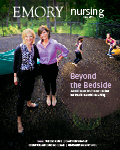Moving Farther Down the Wicket
 "Our infant mortality rate is going down. Not as much as it ought to, but it is a significant change for a country like ours." — Leila McWhinney-Dehaney
"Our infant mortality rate is going down. Not as much as it ought to, but it is a significant change for a country like ours." — Leila McWhinney-Dehaney
|
A Primate Researcher Follows the Call Health Care and the Bottom Line 40 Years of Global Health Action Moving Farther Down the Wicket |
"I am not sure whether I chose Emory, or Emory chose me," says Jamaican nursing leader Leila McWhinney-Dehaney 06PhD.
Prior to studying at the School of Nursing, McWhinney-Dehaney was an experienced nurse-midwife who had long been involved in the dialogue on the health sector in Jamaica, the Caribbean, and the rest of the world. She met Marla Salmon, then dean of the School of Nursing, who was working with Caribbean health leaders to address nursing workforce issues in the region under the auspices of the Lillian Carter Center for Global Health & Social Responsibility. Salmon encouraged McWhinney-Dehaney to enter the doctoral program.
A year after completing her PhD, McWhinney-Dehaney became the chief nursing officer with the Jamaican Ministry of Health. She is past chair of the Regional Nursing Body of CARICOM (Caribbean Community), serves with the Global Leadership Collaborative of the World Health Organization, and formerly advised a research initiative on HIV policy development in sub-Saharan Africa and the Caribbean at the University of West Indies School of Nursing. For these efforts, she received the 2012 Sheth Distinguished International Alumni Award from Emory last fall.
McWhinney-Dehaney credits Salmon with shaping her career path and strengthening nursing education and practice in Jamaica and the Caribbean. "Marla focused on nursing leadership and opportunities to develop and sustain the nursing workforce," she says. "She had a tremendous influence on the Regional Nursing Body. She recognized the need for Emory to have an international presence in nursing."
Like many countries, Jamaica struggles to promote health and prevent disease. Nurses are poised to provide solutions. "They are the ones who are always in contact with the patient," McWhinney-Dehaney explains. "Once a nurse is in place, then there ought to be a significant difference in the life of the client and the nation."
Jamaica is striving to meet the eight Millennium Development Goals set by the United Nations to address problems related to health, education, poverty, and the environment. As part of this pledge, nurses are charged with promoting immunizations to reduce childhood mortality and acquiring advanced skills in midwifery to improve maternal health.
"Our infant mortality rate is going down. Not as much as it ought to, but it is a significant change for a country like ours," the chief nursing officer says.
Other factors are critical to good health—education, social support, and collaboration among health care providers. When doctors, nurses, midwives, and pharmacists work as a team, "that gets us farther down the wicket," says McWhinney-Dehaney, referring to the scoring method in cricket, the national sport in Jamaica. "We move closer to our goals."—SWK



